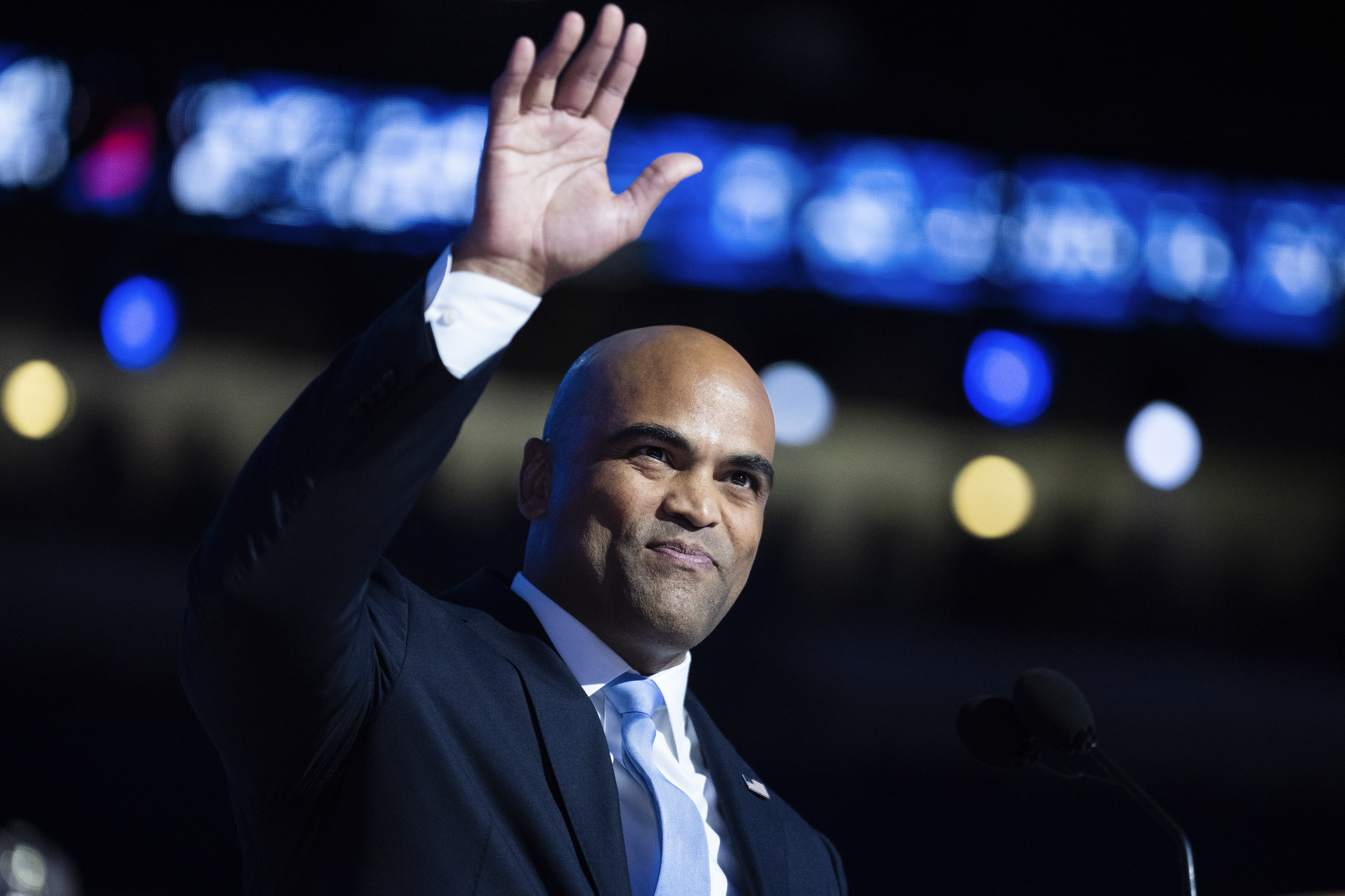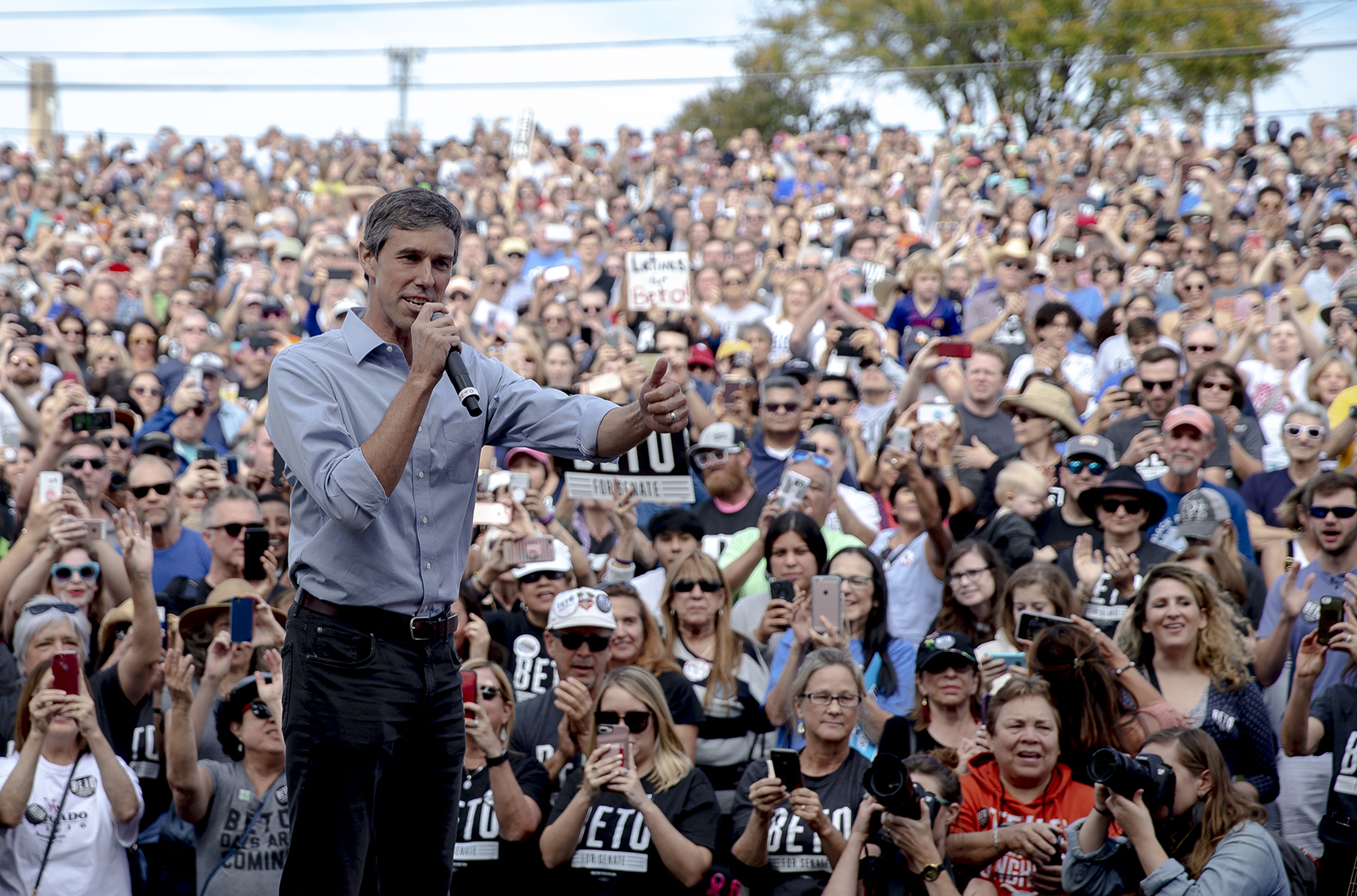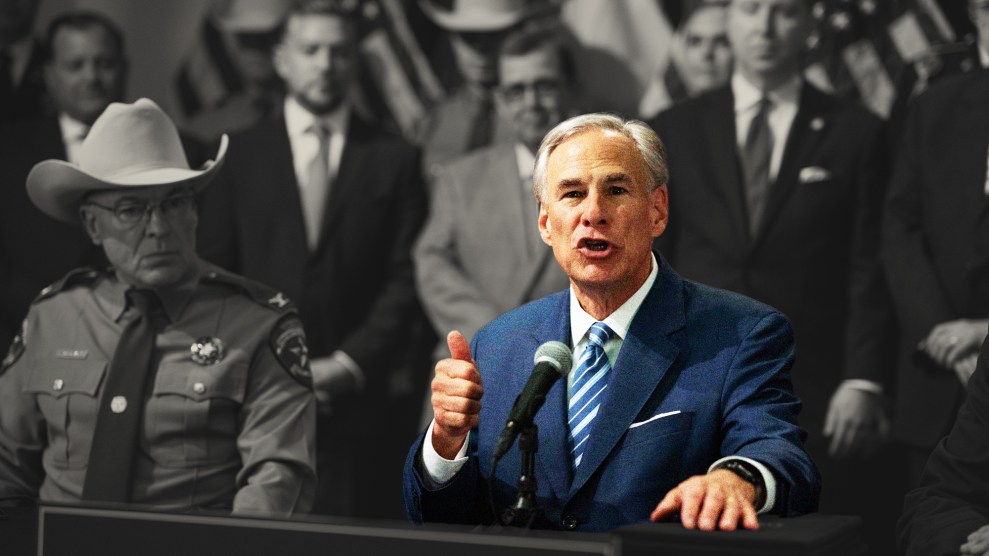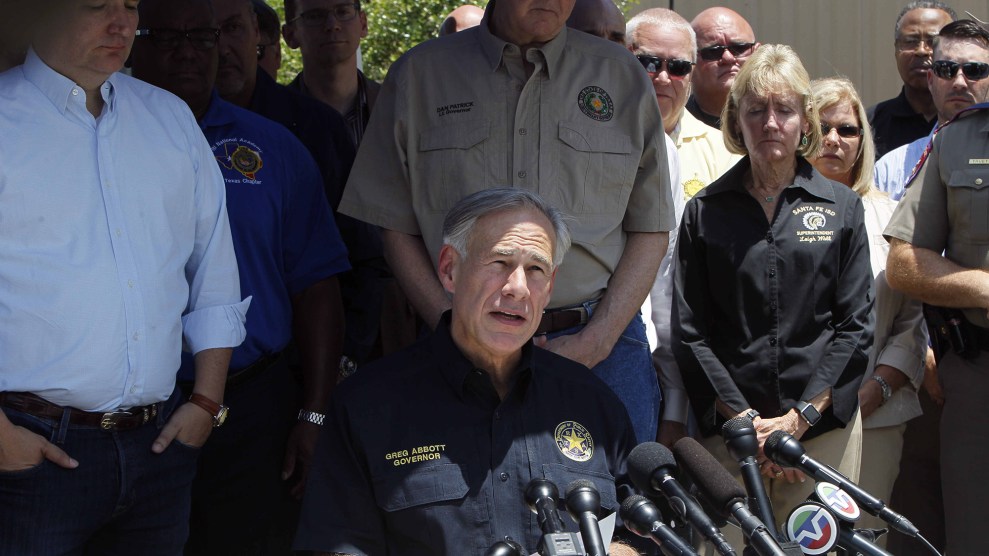The suburbs of North Dallas were once the headquarters of a very particular pre-MAGA version of the Republican Party: genteel, gun-toting, and churchgoing. The men wore beaver-fur cowboy hats, and the women were hairsprayed to the high heavens. As we reported in 2011, the 75205 zip code—some of which falls into the 32nd Congressional District of Texas—was the “most enthusiastically Republican enclave in the country.” But then, changing racial demographics made the district ripe for Democratic picking. In 2018, a 35-year-old Black civil rights lawyer named Colin Allred ousted Pete Sessions, an 11-term Republican congressman. Allred, a stocky former NFL linebacker, has been reelected to the seat twice since, campaigning on his moderate sensibilities and willingness to reach across the aisle.
Now, Allred is running that same play against US Sen. Ted Cruz, a hard-line Republican, in an ever-tightening race. At the Texas Tribune Festival in September, Allred seemed to be nostalgic for that fading Republican archetype who once populated the district he now represents. He described growing up with the “real conservatives,” whom Cruz, he said emphatically, is not. Allred paints Cruz as a divisive extremist and has been courting Republicans who “don’t see themselves reflected in this version of the Republican Party.”
And that strategy seems to be working—last week, the Cook Political Report shifted the race to “lean Republican.” Most polls show Allred within single digits of Cruz, and one has Allred leading by one point. With Democrats defending incumbents in Ohio and Montana, flipping Texas could make the difference in maintaining their governing majority in the Senate. After some Democrats pushed the party to invest more in Allred’s campaign, both the Democratic Senatorial Campaign Committee and Democratic National Committee announced investments in Texas.
But Texas Democrats have not won a statewide election since 1994. The closest they have come was former El Paso Rep. Beto O’Rourke’s freewheeling 2018 campaign against Cruz. O’Rourke famously campaigned in all 254 counties, crisscrossing the state in his maroon Dodge Caravan. He livestreamed his every move on Facebook: chatting while getting a haircut, skateboarding in a Whataburger parking lot, and going on predawn jogs with supporters. O’Rourke ultimately lost by fewer than three points—which some Democrats count as a victory—and won a place as a mythic figure in the state party. He is the ghost haunting Allred’s campaign. Every dollar raised, poll conducted, and door knocked inspires comparisons to 2018’s high-water mark.
By most measures, Allred is a strong candidate and has assembled quite a war chest, having outraised Cruz this year. And the junior senator from Texas certainly appears concerned about the race—Cruz’s campaign has called the election the “fight of our lives.” And in a surprising twist, the hyperpartisan Cruz, who built his career as a culture warrior, has attempted to gain an advantage by arguing that he has a bipartisan record.
Allred, who can come off as stiff and overly scripted, hasn’t inspired the kind of Democratic fervor that O’Rourke enjoyed. But he has been appealing to moderate Republicans and independents who may be alienated by Cruz’s MAGA approach, talking openly about Democratic failures to address the border crisis. The central question: Is running a middle-of-the-road campaign the strategy for winning a race that O’Rourke so narrowly lost?

Campaigning for statewide office in Texas, which is slightly larger than France and has a population of 30 million, is comparable to running for president of some countries. Hispanics are now the largest population group in the state, and the numbers of Black and Asian residents are also growing. Texas contains four of the most populous cities in the US and some of the most expensive media markets. Allred’s robust campaign coffers have made it possible for him to blanket urban centers with television ads. But a more difficult challenge is what veteran journalist and editor of the website Quorum Report Scott Braddock called the “imagination gap”: Texans under the age of 30 have never seen a Democrat win a statewide election.
The last Democrat to do so was Bob Bullock, who was reelected as lieutenant governor in 1994, the same year that former President George W. Bush first became governor. Since then, there have been a series of high-profile losses. From the “dream team” of statewide candidates in 2002 to popular Houston Mayor Bill White’s gubernatorial campaign in 2010, Democrats have routinely raised their hopes, only to be crushed by Republicans. In 2014, they thought they had a real shot at the governor’s mansion with Wendy Davis, the state senator who rose to national prominence when her marathon filibuster delayed a restrictive abortion bill. Bolstered by Battleground Texas, a new PAC launched by two Obama campaign alums, Davis ran on a compelling biography as a single mother who wound up at Harvard Law School. But her campaign struggled to stay on message and was outraised and outspent by Greg Abbott in his first gubernatorial campaign. She lost by 20 points.
In 2018, Texas Democrats found a new standard-bearer in O’Rourke, the lanky, indefatigable 46-year-old US congressman from El Paso. He made a point of throwing out the Democratic playbook, initially pledging to go without pollsters and consultants and to refuse donations from corporations and super-PACs. O’Rourke was a kind of political Rorschach test. Mark Jones, a political science professor at Rice University, said, “O’Rourke was successfully able to be everything to everyone.” He had progressive bona fides, supporting universal health care, abortion rights, and an assault rifle ban. He capitalized on Democratic outrage around former President Donald Trump’s family separation policies, leading a Father’s Day protest outside a detention facility for immigrant children. But he could also be, as Jones put it, a “post-partisan pragmatist.” He had a centrist voting record in Congress and a long-standing friendship with Republican US Rep. Will Hurd—the two livestreamed their road trip from San Antonio to Washington, DC, in 2017. Ignored by Cruz for the first several months of the campaign, O’Rourke’s shifting and sometimes contradictory narratives went largely unchallenged.
“O’Rourke was successfully able to be everything to everyone.”
With an army of volunteers and record-breaking fundraising from both inside and outside the state, O’Rourke came tantalizingly close to defeating Cruz, losing by 2.6 points. As Gus Bova wrote in the Texas Observer, O’Rourke “broke the mold” in 2018, defying political gravity and reinvigorating Texas Democrats. But after disappointing showings in the 2019 Democratic presidential primary and the 2022 gubernatorial race, some have wondered whether O’Rourke’s political career is over. O’Rourke now leads a voter registration PAC and recently joined second gentleman Doug Emhoff on a fundraising turn through Texas—including a stop at his beloved Whataburger.
When it comes to the prospect of a blue Texas, one can’t blame Democrats for feeling like Charlie Brown winding up to kick the football again, despite knowing that Lucy is going to yank it away every time. And it might be hard to rustle up enthusiasm for a candidate who is decidedly less compelling than O’Rourke.

For the last eight years, Democrats have harbored hopes that, eventually, Trump and his allies will become so extreme that they will alienate their own base. And for many, Cruz could be the perfect example of a Republican who should have been jettisoned by the GOP long ago. When he arrived in the Senate in 2013, fueled by the insurgent tea party, he made a name for himself as a far-right obstructionist with a penchant for showmanship. That year, his long-shot attempt to undercut the Affordable Care Act—involving a 21-hour Senate speech and a reading of “Green Eggs and Ham”—led to a two-week government shutdown and was harshly criticized by other Republicans. Then there was his ill-fated and embarrassing presidential primary bid in 2016, which culminated in a surprising speech at the Republican National Convention during which he urged delegates to vote their consciences and declined to endorse Trump. But Cruz walked back his condemnation of Trump when it became apparent that it would irreparably harm his political career. And, of course, there is Democrats’ favorite Cruz gaffe of them all: jetting off to Cancun, Mexico, during a deadly winter storm in 2021. (He apologized upon his return.) These days, Cruz also makes time to record his thrice-weekly podcast.
Nonetheless, polling finds that Cruz remains popular among Texas Republicans, and he may be bolstered by Trump’s appearance on the ticket. But a June poll found that only 25 percent of self-identified independents, a key voting group, approved of him. His recent attempts to rebrand as an effective legislator and unsung bipartisan hero may speak to that concern.
Early in the race, Allred’s campaign was so lackluster that it inspired a great deal of grumbling from within the Texas Democratic Party. “Where is Colin Allred?” a prominent West Texas lawyer and Democrat asked on X in August. Allred had done few public events and made even fewer media appearances before the final night of the Democratic National Convention, when he gave a speech shortly before Vice President Kamala Harris. For most people outside Texas (and even some within it), this was likely the first time they heard that Cruz was facing a challenger. In the weeks since then, Allred’s campaign has picked up its pace. But Allred has mostly opted for smaller meetings over large rallies and town halls, and his campaign has organized mostly identity-focused coalition groups—including women, Asian Americans, and Black Texans. Last week, his campaign announced “Republicans for Allred,” chaired by former US Rep. Adam Kinzinger, a prominent anti-Trump Republican who also endorsed Harris.
The Allred campaign declined to make the candidate available for an interview and instead suggested I speak to Olivia Julianna, a social media activist who is advising the campaign on youth voter turnout. When asked why larger rallies haven’t been a focus of his campaign, she replied, “This is a more strategic, targeted way of reaching people and bringing them in on these very issue-focused events that are about [what] they care about the most.”
At the Texas Tribune Festival, Allred was asked about a note from O’Rourke, who said in an interview that he’d like to see more of Allred, particularly in “unscripted” moments. It’s difficult to campaign in such a large state, Allred said, a bit defensively, and pointed out that he had made 50 stops in 22 cities in the past month.
Allred’s restraint is underscored by comparisons with O’Rourke, who was endlessly available to voters. Even Cruz, perhaps relieved to know that he will not have to face O’Rourke again, has spoken with some admiration about O’Rourke and noted that he and Allred are “very different candidates.” In August, Cruz told the Texas Tribune: “Beto O’Rourke was charismatic. He was tireless. He campaigned all over the state, and he became a phenom.”
Matt Angle, a longtime Democratic political strategist in Texas, said Allred’s more traditional, buttoned-up campaign can still be successful, as having high message discipline is usually considered to be a good thing in a candidate. “Some people like the excitement of someone who is spontaneous, [and] there’s a lot to be said about leading a pep rally,” Angle told Mother Jones. “But I like candidates who are trying to figure out how to win.”
“Democrats in Texas always face this a no-win situation: The more they appeal to moderate voters, the greater the risk they run that the base doesn’t turn out for them…The more they focus on the base, the more they alienate moderate voters and push them over to the Republicans. ”
Some Democrats have worried that Allred is taking the base for granted and focusing too much on moderates. Even though he endorsed Harris’ presidential bid, he’s largely kept her and other national Democrats at arm’s length. In fact, it sometimes seems as though Allred would rather voters not view him as a Democrat at all. In May, he told Texas Monthly that the race is “not about voting for Democrats. This race is about me versus Ted Cruz specifically.”
Jones, the professor from Rice University, said the best strategy, which Allred seems to be employing, is relying on Harris to mobilize progressives while he targets moderate Republicans and independents. “Democrats in Texas always face this a no-win situation: The more they appeal to moderate voters, the greater the risk they run that the base doesn’t turn out for them,” Jones said. “However, the more they focus on the base, the more they alienate moderate voters and push them over to the Republicans. You’re damned if you do, damned if you don’t.”
Allred’s policies are generally consistent with those of the Democratic Party: He wants to expand Medicaid, codify Roe v. Wade, and reduce gun violence. But he has attempted to distance himself when it comes to immigration and border security, which have become the centerpieces of his campaign. A June poll found that 47 percent of Texans strongly disapproved of President Joe Biden’s approach to immigration and border security. Immigration has become a weak point for Democrats at large, as border crossings have risen to record levels and strained federal and local resources. To combat accusations of being weak on the border, Democrats have begun to support some immigration policies that they opposed under Trump, and, as many have pointed out, are sometimes indistinguishable from Republicans in their rhetoric of being “tough” on the border.
Allred is not an exception, and he has been willing to go further than other members of his party. In January, he voted alongside two other Texas Democrats in support of a Republican-led congressional resolution that condemned Biden’s border policies. On the campaign trail, he often cites his family connection to the Rio Grande Valley—his maternal grandfather was a customs agent at the Gateway International Bridge in Brownsville—and he’s said current immigration policies have placed an undue “burden” on border communities.
But Allred’s rhetoric on border security was not always so tough. In 2018, when he was running for the House of Representatives, he called Trump’s border wall “racist” and pledged to tear it down. Yet last October, he commended Biden’s decision to continue border wall construction, describing it as a “necessary step.” In a recent TV spot reminiscent of a Ford F-150 ad, Allred emerges from a white pickup truck to survey the border wall. The law enforcement officials accompanying him declare that Cruz has been “all hat, no cattle” on border security, while Allred has been “tough” and “[stood] up to extremists in both parties.”
Allred’s campaign declined to respond to specific questions from Mother Jones on border security. His campaign website says he supports “common-sense” immigration measures and pathways to citizenship for those who are “obeying the law, working hard, [and] paying taxes.”
I asked Joaquin Castro, the Democratic congressman from San Antonio, about Allred’s position on the border. He said his congressional colleague is trying to strike a “reasonable balance,” disagreeing “with the dehumanization of people” while pushing for more funding for border security.
Earlier this year, a bipartisan border security bill failed to pass because of pressure from Trump. Described by Biden as the “strongest border deal the country has ever seen,” the measure was the result of negotiations with some of the most conservative members of Congress, including Oklahoma Sen. James Lankford. It would have increased funding for enforcement, restricted asylum applications, and expanded the government’s authority to deport migrants. The bill’s failure presented a unique opportunity for Democrats to turn the border blame game back on Republicans. Allred has campaigned widely on Cruz’s opposition to the deal, saying Cruz voted against it only because, like the former president, “he wanted to have the issue to run on in November.”
A persistent Democratic mantra is that Texas is not so much a red state as a non-voting blue one. In 2020, Manny Garcia, who was then the state Democratic Party’s executive director, told Reuters, “Texas is in play because there are more of us than there are of them.” But organizers emphasize that electoral transformation takes time and investment. Michelle Tremillo, co-executive director of the Texas Organizing Project, said her group focuses on engaging Black and Latino first-time voters and “building that cycle of participation is long-term work.” Democrats already have made progress in county and district elections—such as with Lina Hidalgo, a 27-year-old Colombian immigrant who defeated a popular Republican incumbent to lead the Harris County Commissioners Court in 2018. “With each election cycle, we are chipping away at a statewide gap,” Tremillo said.
Such voter mobilization efforts are relatively new in Texas, particularly on the statewide level. A decade or so ago, political infrastructure for Democrats in Texas was like “actual infrastructure in Afghanistan,” said Braddock, the journalist. There were Democrats concentrated in large urban counties, but there was “nothing to connect them,” he said. State-level campaigns were largely left to do everything on their own: fundraising, coordinating events, and organizing volunteers for phone banks and door-knocking. Angle, the political strategist, told Mother Jones that back then, “the resources to expand and coordinate to win a statewide race weren’t available.”
The 2018 O’Rourke campaign showed Democrats that a statewide grassroots effort was both possible and effective. There are now more progressive voter groups in Texas—some run by O’Rourke campaign alums. Katherine Fischer, who worked on O’Rourke’s Senate campaign and now runs Texas Majority PAC, said, “There’s now a much stronger network performing organizing work, which lessens the campaign’s burden.”
“Success this year is not measured by who wins. It’s measured by watching how much closer they get.”
This past summer, Texas Democrats announced that Allred’s campaign would bundle its efforts with downballot Democratic candidates, coordinating volunteers and sharing data. Called the “Texas Offense,” the campaign described it as the “first statewide coordinated grassroots effort in 20 years.” A recent press release reported that the coalition had logged 600 events and 3,000 volunteer shifts.
Democrats like to call Texas a “game-over” state—if they secure its 40 Electoral College votes, Republicans will find it very difficult to win the presidency. Although Jimmy Carter was the last Democratic presidential candidate to win in Texas in 1976, Democrats are quick to point out that the margins have progressively narrowed in the last decade. In 2012, Barack Obama lost Texas by 15.8 points. Hillary Clinton lost by nine, and Biden lost by 5.6. This year, Democrats are simply hoping to move the needle closer in the presidential race. “Success this year is not measured by who wins. It’s measured by watching how much closer they get,” said Tory Gavito, president of Way to Win, a Democratic advocacy group.
However much Democrats may hope for an Allred victory, not many are expecting one. After 30 years of being proven wrong, Democrats are tempering their optimism—and their low expectations might prove to be a real liability for Allred. On a recent episode of the Bulwark Podcast, O’Rourke told journalist Tim Miller that politics is a “confidence game.”
“Can [Allred] generate enough excitement to convince people that he can win?” O’Rourke asked. “If people believe this is possible, then they’ll act like it’s possible.”

















